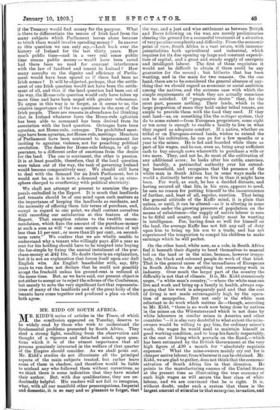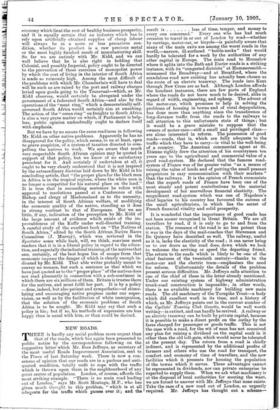MR. KIDD ON SOUTH AFRICA.
MR. KIDD'S series of articles in the Times, of which the conclusion appeared on Tuesday, deserve to be widely . read by those who wish to understand the fundamental . problems presented by South. Africa. They shed a strong light, resulting from the observation and thought of . a. vigorous and detached mind, upon ques- tions which it is of the utmost importance that, all persons genuinely interested in the welfare of that quarter of the Empire should consider. As we shall point out, Mr. Kidd's studies do not illuminate all the principal aspects of the main subjects treated, but rather leave. some of them in shadow, and therefore would be, liable' to mislead any who followed them without correctives,.as we think there is some indication that they have misled their author. But, with due qualifications, they are un- doubtedly helpful. His readers will not fail to recognise, what, with all our manifold other preoccupations, Imperial analdomestic,.it is so easy and so pleasant, to forget, that the war, and a just and wise settlement as between British and Boers following on the war, are merely preliminaries clearing the ground for a successful treatment of a situation of very peculiar complexity and difficulty. From the economic point of view, South Africa is a vast estate, with immense potentialities both agricultural and industrial, which requires for its due opening up large and constant expendi- ture of capital, and a great and steady supply of energetic and intelligent labour. The first of these requisites it would not be difficult to obtain if there could be any guarantee for the second ; but hitherto that has been wanting, and in the main for two reasons. On the one hand, there are to be considered the general absence of any- thing that we should regard as economic or social ambition among the natives, and the extreme ease with which the simple requirements of which they are actually conscious can be satisfied. Of " progressive desire " they, for the most part, possess nothing. Their lands, which in the large proportion of cases they hold under tribal tenure, are ample to provide them with the food they need. If they rent land—as, on something like the metayer system, they do to some extent—from European proprietors, some eight or ten acres is enough to enable a family to live in what they regard as adequate comfort. If a native, whether on tribal or on European-owned lands, wishes to extend the area of his cultivation, he can go for a few months or a year to the mines. He is fed and boarded while there as part of his wages, and he can, even so, bring away sufficient cash to buy enough cows wherewith to purchase a wife or two more. They, and not he, do most of the cultivation of any additional acres ; he looks after his cattle, exercises, not harshly, a patriarchal authority over his extend- ing household, and recognises that the presence of the white man in South Africa has in some ways made the world a distinctly better one to live in than it might have been. For work, as such, he has a decided distaste, and having secured all that life, in his eyes, appears to need, he sees no reason for putting himself to the inconvenience of further, and, least of all, regular, exertion. That being the general attitude of the Kaffir mind, it is plain that unless, or until, it can be altered—as it is altering in some districts under the growing pressure of population on the means of subsistence—the supply of native labour is sure to be fitful and scanty, and its quality must be wanting in intelligence. For, having done so well for himself on the land, the average Kaffir has not felt any call of duty upon him to bring up his son to a trade, and has not experienced the temptation to compel his children to make earnings which he will pocket.
On the other hand, white men, as a rule, in South Africa. feel it beneath their dignity to bend themselves to manual toil on the land or in the mine, because, however irregu- larly, the black and coloured people do work of that kind. That is the general cause of the unreadiness of Europeans in South Africa to do anything but overseeing work in industry. Over much the larger part of the country the difficulty is not that of climate. It is, Mr. Kidd strenuously urges, " a white man's country,"—where the white man can live and work and bring up a family in health, always sup- posing that his work is adequately paid and that the cost of living is not made extravagantly high by the opera- tion of monopolies. But not only is the white man reluctant to do work which natives do—though, according to Mr. Kidd, " there is no work now being done by natives in the mines on the Witwatersrand which is not done by white labourers in similar mines in America and other countries "—it is also very doubtful to what extent the mine- owners would be willing to pay him, for ordinary miner's work, the wages he would need to maintain himself in good working condition, and to keep his family respectably, at the cost of living which prevails on the Rand,—which has been estimated by the British Government at the very high figure of £30 a month for " absolutely requisite expenses." What the mine-owners mainly cry out for is cheaper native labour, from wherever it can be obtained. Mr. Kidd, we are glad to gather, does not think that the economic salvation of South Africa, lies in that direction. He points to the manufacturing success of the United States at the present time as illustrating the true economy of such high wages as will secure the best class of white labour, and we are convinced that he is right. It is, without doubt, under such a system that there is the largest amount of stimulus to that enterprise, invention, and economy which lie at the root of healthy business prosperity, and it is equally certain that an industry which has to rely upon artificially obtained supplies of cheap labour will always be in a more or less precarious con- dition, whether its product is a raw precious metal or the most highly finished result of manufacturing skill. So far we are entirely with Mr. Kidd, and we can well believe that he is also right in holding that Colonial, and possibly Imperial, policy ought to be directed to the prevention of those exercises of monopolist power by which the cost of living in the interior of South Africa is made so ruinously high. Among the most difficult of the problems with which Mr. Chamberlain will have to deal will be such as are raised by the port and railway charges levied upon goods going to the Transvaal—which, as Mr. Kidd observes, would certainly be abrogated under the government of a federated South Africa—and also by the operations of the "meat ring," which a democratically self- governed South Africa would certainly aim at smashing. The action of the " ocean ring " on freights to South Africa is also a very grave matter on which, if Parliament is help- less, public opinion undoubtedly ought to declare itself with emphasis.
But we have by no means the same readiness in following Mr. Kidd on other native problems. Apparently he has no disapproval for the policy, which seems, to us at least, open to grave suspicion, of a system of taxation directed to com- pelling the natives to work. We are aware that much very respectable South African opinion may be quoted in support of that policy, but we know of no satisfactory precedent for it. And certainly if undertaken at all, it ought to be very clearly understood that it is not inspired by the extraordinary doctrine laid down by Mr. Kidd in his concluding article, that "the proper place for the black man in Africa, is in the tropical regions, where the white man is no longer a competitor for his natural place on the land." It is true that in succeeding sentences he refers with approval to resolutions passed at a Conference of the Bishop and clergy of Mashonaland as to the necessity, in the interest of South African welfare, of modifying the economic quality of the native, standing as it does in strong contrast to that of Europeans. But we see little, if any, indication of the perception by Mr. Kidd of the large amount of evidence which exists of the im- provableness of the Kaffir under well-directed training. A careful study of the excellent book on "The Natives of South Africa," edited by the South African Native Races Committee (J. Murray), which was reviewed in the Spectator some while back, will, we think, convince most readers that it is in a liberal policy in regard to the educa- tion, and especially the industrial training, of the natives that one, certainly, of the best hopes lies of escape from that economic impasse the danger of which is clearly enough in- dicated by Mr. Kidd. That able writer probably meant to convey no menace, but such a, sentence as that which we have just quoted as to the " proper place " of the natives does not read pleasantly in connection with a sub-continent in which there are six millions of them. Britain is trustee there for the natives, and must fulfil her part. It is by a policy —firm, indeed, but also patient and sympathetic—of stimu- lating and encouraging native progress under our super- vision, as well as by the facilitation of white immigration, that the solution of the economic problems of South Africa is to be sought. Mr. Kidd may say that such a policy is his ; but if so, his methods of expression are less happy than is usual with him, or than could be desired.







































 Previous page
Previous page